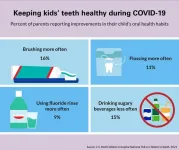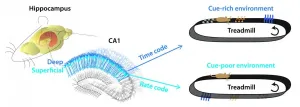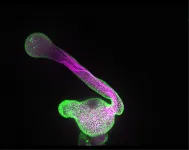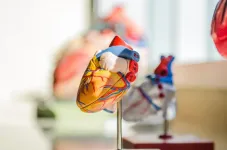(Press-News.org) The UK's commercial fishing industry is currently experiencing a number of serious challenges.
However, a study by the University of Plymouth has found that managing the density of crab and lobster pots at an optimum level increases the quality of catch, benefits the marine environment and makes the industry more sustainable in the long term.
Published today in Scientific Reports, a journal published by the Nature group, the findings are the result of an extensive and unprecedented four-year field study conducted in partnership with local fishermen off the coast of southern England.
Over a sustained period, researchers exposed sections of the seabed to differing densities of pot fishing and monitored any impacts using a combination of underwater videos and catch analysis.
They found that in areas of higher pot density, fishermen caught 19% less brown crab and 35% less European lobster, and their catches of brown crab were on average 35 grams per individual (7%) lighter.
The effect on marine species was also significant with two ecologically important reef species, Ross coral (Pentapora foliacea) and Neptune's Heart sea squirt (Phallusia mammillata), 83% and 74% less abundant respectively where pot density was higher.
Researchers say the study provides evidence of a pot fishing intensity 'threshold' and highlights that commercial pot fisheries are likely to be compatible with marine conservation when managed correctly at low, sustainable levels.
The study was carried out by academics from the University's School of Biological and Marine Sciences, with funding from Defra and the Blue Marine Foundation and working with the Lyme Bay Consultative Committee.
It builds on an interim report published by Defra in 2019, and research published in October 2020 which used previously unseen footage to show the environmental impacts of pot fishing.
Dr Adam Rees, Post-Doctoral researcher and lead author on the current research, said: "The effects of bottom-towed fishing have been clearly shown as part of the University's long-term monitoring project in Lyme Bay. But before we started this research, very little was known about the precise impacts of pot fishing over a prolonged period. We have shown that - if left unchecked - it can pose threats but that changing ways of working can have benefits for species on the seabed and the quality and quantity of catches."
The study focussed on the Lyme Bay Reserve, a 206 km² area that has been protected from all bottom-towed fishing since 2008. It is part of the Lyme Bay and Torbay Special Area of Conservation, a 312 km² section of the English Channel that is predominantly fished by small boats operating out of towns and villages.
The University has been assessing the seabed recovery since 2008 and has previously demonstrated that several species have returned to the area since the MPA was introduced. Recommendations from this work have been included within the Government's 25-year Environment Plan, and a major UK government report into Highly Protected Marine Areas (HPMAs), led by former Defra Fisheries Minister Richard Benyon.
This latest study comes just days after the Marine Management Organisation (MMO) signalled its intent to ban bottom trawling at various offshore MPAs around the UK.
Dr Emma Sheehan, Associate Professor of Marine Ecology and one of the study's co-authors, said: "Over a decade ago, the fishing community in Lyme Bay realised that changing the way they fish was essential to the sustainability of their industry. We have worked closely with them ever since to take their concerns into account and attempt to provide them with solutions. This study is the latest part of our ongoing work to establish the best ways to both preserve their traditions and enhance the environment they work in."
Martin Attrill, Professor of Marine Ecology and senior author on the research, added: "The fishing industry is currently facing huge uncertainty. And we of course know that every fishing community is different. But with the drive to further enhance marine protection around the UK, some of the lessons we have learned in Lyme Bay could help other fleets make changes that can secure their long-term future."
INFORMATION:
It forever changed history when it crashed into Earth about 66 million years ago.
The Chicxulub impactor, as it's known, left behind a crater off the coast of Mexico that spans 93 miles and runs 12 miles deep. Its devastating impact brought the reign of the dinosaurs to an abrupt and calamitous end by triggering their sudden mass extinction, along with the end of almost three-quarters of the plant and animal species living on Earth.
The enduring puzzle: Where did the asteroid or comet originate, and how did it come to strike Earth? Now, a pair of researchers at the Center for Astrophysics | Harvard & Smithsonian believe they have the answer.
In a study published today in Nature's Scientific Reports, Harvard University ...
When the Covid-19 pandemic struck in early 2020, doctors and researchers rushed to find effective treatments. There was little time to spare. "Making new drugs takes forever," says Caroline Uhler, a computational biologist in MIT's Department of Electrical Engineering and Computer Science and the Institute for Data, Systems and Society, and an associate member of the Broad Institute of MIT and Harvard. "Really, the only expedient option is to repurpose existing drugs."
Uhler's team has now developed a machine learning-based approach to identify drugs already on the market that could ...
A new study finds that California's commuters are likely inhaling chemicals at levels that increase the risk for cancer and birth defects.
As with most chemicals, the poison is in the amount. Under a certain threshold of exposure, even known carcinogens are not likely to cause cancer. Once you cross that threshold, the risk for disease increases.
Governmental agencies tend to regulate that threshold in workplaces. However, private spaces such as the interior of our cars and living rooms are less studied and less regulated.
Benzene and formaldehyde -- both used in automobile manufacturing -- are known to cause cancer at or above certain levels of ...
Far underneath the ice shelves of the Antarctic, there's more life than expected, finds a recent study in the journal Frontiers in Marine Science.
During an exploratory survey, researchers drilled through 900 meters of ice in the Filchner-Ronne Ice Shelf, situated on the south eastern Weddell Sea. At a distance of 260km away from the open ocean, under complete darkness and with temperatures of -2.2°C, very few animals have ever been observed in these conditions.
But this study is the first to discover the existence of stationary animals - similar to sponges and potentially several previously unknown species - attached to a boulder on the sea floor.
"This discovery is one of those ...
ANN ARBOR, Mich. - A third of parents say the COVID-19 pandemic has made it difficult to get dental care for their children, a new national poll suggests.
But some families may face greater challenges than others. Inability to get a dentist appointment during the pandemic was three times as common for children with Medicaid versus those with private dental coverage, according to the C.S. Mott Children's Hospital National Poll on Children's Health at Michigan Medicine.
"Regular preventive dental care helps keep children's teeth healthy and allows providers to address any tooth decay ...
We find routes to destination and remember special places because there is an area somewhere in the brain that functions like a GPS and navigation system. When taking a new path for the first time, we pay attention to the landmarks along the way. Owing to such navigation system, it becomes easier to find destinations along the path after having already used the path. Over the years, scientists have learned, based on a variety of animal experiments, that cells in the brain region called hippocampus are responsible for spatial perception and are activated in discrete positions ...
Lipids are the building blocks of a cell's envelope - the cell membrane. In addition to their structural function, some lipids also play a regulatory role and decisively influence cell growth. This has been investigated in a new study by scientists at Martin Luther University Halle-Wittenberg (MLU). The impact of the lipids depends on how they are distributed over the plasma membrane. The study was published in "The Plant Cell".
If plant cells want to move, they need to grow. One notable example of this is the pollen tube. When pollen lands on a flower, the pollen tube grows directionally into the female reproductive organs. This allows the male gametes to be delivered, so fertilisation can occur. The pollen tube is special ...
An international team of scientists has sequenced the genome of a capuchin monkey for the first time, uncovering new genetic clues about the evolution of their long lifespan and large brains.
Published in PNAS, the work was led by the University of Calgary in Canada and involved researchers at the University of Liverpool.
"Capuchins have the largest relative brain size of any monkey and can live past the age of 50, despite their small size, but their genetic underpinnings had remained unexplored until now," explains Professor Joao Pedro De Magalhaes, who researches ageing at the University of Liverpool.
The researchers developed and annotated a reference assembly for white-faced ...
Aspirin should be favoured over warfarin to prevent blood clotting in children who undergo a surgery that replumbs their hearts, according to a new study.
The research, led by the Murdoch Children's Research Institute (MCRI) and published in The Journal of Thoracic and Cardiovascular Surgery, will have implications for clinicians when prescribing blood thinning medications after Fontan surgery, a complex congenital heart disease operation redirecting blood flow from the lower body to the lungs.
The Fontan procedure is offered to children born with severe heart defects, allowing the child to live with just one pumping heart chamber ...
In a SWOG Cancer Research Network trial that put three targeted drugs to the test, the small molecule inhibitor cabozantinib was found most effective in treating patients with metastatic papillary kidney cancer - findings expected to change medical practice.
These findings will be presented at ASCO's virtual 2021 Genitourinary Cancers Symposium on Feb. 13, 2021 at 1 p.m. ET. The findings will be simultaneously published in The Lancet.
There are currently no effective treatments for metastatic papillary kidney cancer, or metastatic pRCC, a rare subtype of kidney cancer. One study of 38 patients found that the average survival ...







